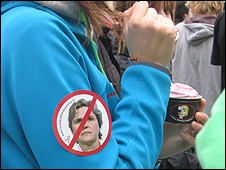|
The far-right contender in Austria's presidential election on Sunday has stirred up debate about the country's anti-Nazi legislation, the BBC's Bethany Bell reports.

The FPOe makes much of defending conservative Austrian traditions
|
A brass band in traditional Austrian costume played oompah music in a baroque cobbled square in the town of St Poelten. A rally for Barbara Rosenkranz, the far-right Austrian Freedom Party (FPOe) candidate for president, was under way. There was a visible police presence. In the neighbouring square, a counter-demonstration by left-wing protesters was taking place. Barbara Rosenkranz, a 51-year-old mother of 10, is a controversial figure. She is married to a man who belonged to a banned extreme right-wing party. And she has criticised parts of Austria's strict anti-Nazi legislation, known as the Verbotsgesetz. In an interview on Austrian television in 2007 she talked about the Verbotsgesetz, saying "the way lawyers interpret it is wishy-washy, open to abuse and isn't in line with our constitution, which protects freedom of opinion." No whitewashing of past Austria was annexed to Nazi Germany in 1938 and was deeply involved in the crimes of the Third Reich. Now it is illegal to deny the Holocaust or to make statements which glorify the Nazi regime.

Mrs Rosenkranz's supporters accuse the media of distorting her views
|
There is a debate in Austria about whether the anti-Nazi legislation is too strict. But the political analyst Thomas Hofer says Mrs Rosenkranz's motives are questionable. "There are liberals in Austria who want to do away with those laws because they are obviously going against freedom of speech. But if she comes from a far-right background - and she does come from that background - it is a different story." Thomas Hofer says Mrs Rosenkranz is trying to appeal to an extreme right-wing minority. "There are some people in Austria who still think that not everything was bad during the Nazi era, so she tried to secure the small base, in terms of revisionists, for the Freedom Party and thought there wouldn't be a big fuss - but there was." International image Mrs Rosenkranz is not expected to win the election on Sunday. Opinion polls say up to 80% of the vote will go to the current president, Heinz Fischer of the Social Democrats (SPOe). But her nomination as the Freedom Party's presidential candidate has caused outrage among Jewish groups, and politicians from the centre-left and centre-right. The presidency is a largely ceremonial post but it involves frequent international visits. Over the past few weeks, Mrs Rosenkranz has denied ever wanting to get rid of the anti-Nazi legislation. She told Austrian television that she "accepts the law, in the form that it is in". Many of her supporters at the rally in St Poelten insisted that she does not have extreme right views.

Protesters see Mrs Rosenkranz as a threat to Austria's stable politics
|
Kathi, a young FPOe worker who said she knew the Rosenkranz family, said Mrs Rosenkranz was "misrepresented by the media". "She was led into a trap. That's not fair. I think Barbara Rosenkranz is a very good woman." Maximilian, wearing a bright blue FPOe jacket, said he was a fan. "I think she was misinterpreted. She has ten children and I also have three siblings so I understand her. She is against immigration. She has the right political views." But many other Austrians disagree. At the counter-demonstration in St Poelten, feelings against her candidacy were running high. One protester, Martin, said it was "a scandal for Austria" that someone with her background was running for the highest position in the state. "Austria was part of Nazi Germany and Barbara Rosenkranz is definitely a sign that this country did not learn from its history." Roman, another protester, said freedom of speech was important, but some lines had to be drawn. "Horrible things happened in that time. If she wants to be president in Austria she shouldn't say such things. Someone like this shouldn't be the representative of our country." Sensitivities about Austria's past still run deep.
|
Bookmark with:
What are these?